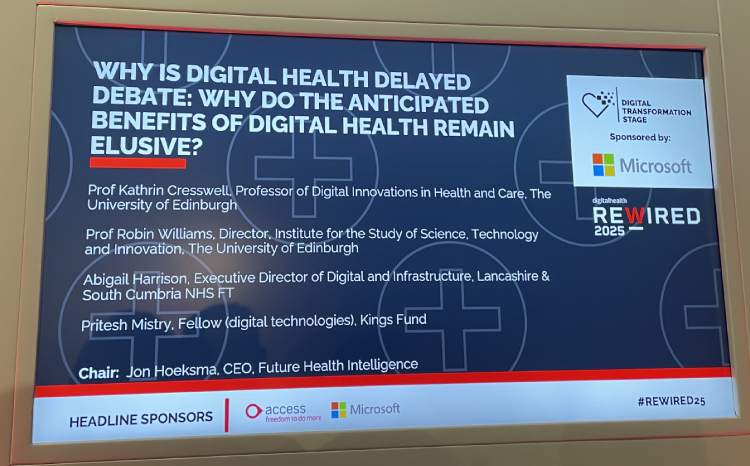Webinar reveals demand for IT evidence
- 1 June 2009
The Royal College of Nursing’s informatics expert has called for better evidence to convince nurses of the benefits of technology for patient care.
Speaking during E-Health Insider’s live video webinar Making Time to Care, Anne Casey said nurses need hard evidence of the benefits that can be achieved.
She cited a survey by the RCN showing that while half of nurses thought that electronic patient records would improve patient safety, 42% still had to be convinced.
Casey said: “It is just not enough to say that the technology works and is safe; it needs to be supported by evidence of fitness and safety. The RCN’s position is that we strongly support ICT in healthcare as long as the evidence base is there.”
The online broadcast sponsored by Cisco Systems focused on how information and communication technologies can help staff to spend more time caring for patients, improving productivity on wards.
The other participants were Paul Volkaerts, business transformation manager at Cisco, and Sue Rushbrook, associate director, systems and network services at York Hospitals NHS Foundation Trust. More than 400 EHI readers signed-up in advance, with more than 100 logging in on the day.
In addition to discussing how to gather evidence for IT, the participants debated how to make the business case for technology investment as NHS budgets come under pressure.
Rushbrook argued that trusts need to focus on efficiency and improvements to patient care; not just on measures such as return on investment.
“When you put in a business case don’t put it in for technology, don’t mention gigabytes and bandwidth, you need to define what you actually are trying to achieve,” she said.
“We need to realise that not all projects are going to be cash realising, but what they do allow trusts to do is become more efficient. People need to get less hooked up on saving money.”
Rushbrook described how, since 2000, York has invested in a state-of-the-art converged Internet Protocol network that has provided the foundation for a raft of subsequent developments, such as better communications using IP handsets.
She also described how York has created a sophisticated bed management system in the Emergency Department, with patient status and admission details – from pending admission to discharge – sent to clinicians’ phones in real time.
“Patients are no longer lost in the system and they can now be accepted for admission by the speciality senior house officer without them having to break off their ward rounds," Rushbrook said, adding that bed managers “are now in control” and that there is “far less duplication of effort”.
Future plans at York include using the network to monitor blood and medicine fridges to deploy asset tracking, for patients and devices.
Cisco’s Paul Volkaerts said that putting money into IT was a difficult decision to make in the current economic climate.
He urged viewers to step back and remember that the aim of investments in technology was “to provide the communications that connect people with people”; and this was an essential pre-requisite for many of the changes NHS trusts want to achieve.
“If patients have been waiting three and a half hours, how does the nurse know – how can they be alerted – that they are within half an hour of breaching a four hour wait? They are all issues to do with communications and making information available where and when it is needed.”
In the final discussion, Casey summed up why many nurses are switched off by IT. “For many nurses IT is not is not sold to them at all as about improving patient care, but is just seen as about collecting data. So we need to show the evidence and communicate it’s not about technology.”
Links:
More information about Sue Rushbrook and York’s achievements is available in our opinion and analysis feature: Just Champion, written after she became Heatlhcare ICT Champion of the Year in last year’s BT e-Health Insider Awards. Entries for this year’s awards are open now.
The full webinar is archieved and available to view at any time.




